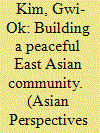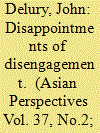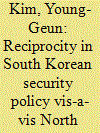| Srl | Item |
| 1 |
ID:
121736


|
|
|
|
|
| Publication |
2013.
|
| Summary/Abstract |
While the thought of a regional community in East Asia comparable to the European Union is premature, I consider the transforming international relationships among North Korea, South Korea, China, Taiwan, and Japan and examine the possibility of realizing such a community via sociocultural approaches. I trace the conceptual origins of East Asia and its historical place in international relations, investigate East Asia in the post-Cold War era through renewed cultural exchanges among the region's countries, and propose a vision of and tasks for an East Asian cultural community
|
|
|
|
|
|
|
|
|
|
|
|
|
|
|
|
| 2 |
ID:
121735


|
|
|
|
|
| Publication |
2013.
|
| Summary/Abstract |
In this article I examine the Korean Wave as an illustrative case of cultural globalization. I examine this new cultural phenomenon in light of the realignment of Korean media and cultural industries. The Korean Wave is a symptom of the discursive formation and practice of Korea's national cultural policy, which aims to advance Korea's global economic competitiveness by promoting innovation and expansion in the creative industries. I identify implications of the Korean Wave for critical theories of cultural globalization and for the Asian region in fostering or hindering regional cooperation and cultural diversity.
|
|
|
|
|
|
|
|
|
|
|
|
|
|
|
|
| 3 |
ID:
121733


|
|
|
|
|
| Publication |
2013.
|
| Summary/Abstract |
As a presidential candidate, Barack Obama boldly promised to enhance US engagement with North Korea (Democratic People's Republic of Korea; DPRK). But in his first term as president, his administration was determined to significantly lower the foreign policy priority of North Korea and carried out a policy of concerted disengagement, an approach the administration called "strategic patience." The strategy of disengagement showed disappointing results by late 2010, and so the United States made a begrudging, tactical adjustment by starting tentative bilateral talks with the DPRK. When the preliminary result of those talks-the "Leap Day Deal"-fell apart in 2012 over the satellite launch controversy, the wrong lesson was learned: that neither sanctions nor engagement works with Pyongyang. The real lesson of Obama's North Korea policy is the failure of disengagement.
|
|
|
|
|
|
|
|
|
|
|
|
|
|
|
|
| 4 |
ID:
121738


|
|
|
|
|
| Publication |
2013.
|
| Summary/Abstract |
We attribute the negative perceptions between South Korea and China to the absence of real argumentative interaction. Argumentative interaction is a social process that seeks mutual understanding through persuasive and noncoercive action. The argumentative process helps state actors to minimize their negative perceptions and to reach mutual understanding-an evolutionary process that leads to perceptional change. In the case of South Korea and China, two conditions are known to instigate arguing: uncertainty and conscious efforts by both actors. The governments and elites of both states should take significant roles in seeking policy alternatives and in building a healthy cyberspace.
|
|
|
|
|
|
|
|
|
|
|
|
|
|
|
|
| 5 |
ID:
121734


|
|
|
|
|
| Publication |
2013.
|
| Summary/Abstract |
I review the principle of reciprocity in South Korean security policy with regard to North Korea and the United States and analyze how the principle fits with US security policy concerning South Korea. Diffuse reciprocity shaped Korean security policy starting with President Kim Dae-jung's Sunshine Policy. The Lee Myung-bak government's hard-line approach increased military tension and economic anxiety on the peninsula. The new South Korean government under Park Geun-hye should devise achievable policy measures rather than place excessive pressure or unrealistic demands on North Korea.
|
|
|
|
|
|
|
|
|
|
|
|
|
|
|
|
| 6 |
ID:
121737


|
|
|
|
|
| Publication |
2013.
|
| Summary/Abstract |
In this study I establish a universal typology of Chinese political elites and trace the elites' transformation by analyzing the demographic and sociopolitical composition of the Chinese Communist Party's Central Committee. The data set comprises the full and alternate membership of the Central Committees, from the First (1921) to the Seventeenth (2007). China's political elites started out as ideology-oriented/replacement types with strong unity, low differentiation, and wide circulation through radical methods. However, they have evolved into fragmented/reproductive types with weak unity, high differentiation, and narrow circulation through moderate methods.
|
|
|
|
|
|
|
|
|
|
|
|
|
|
|
|